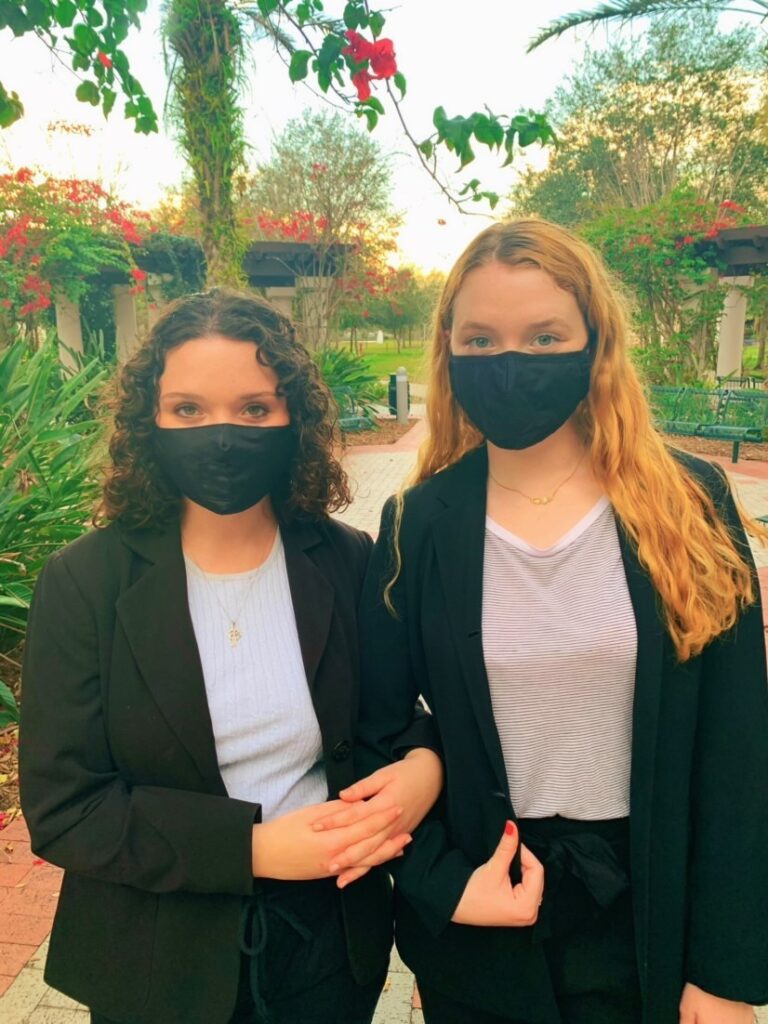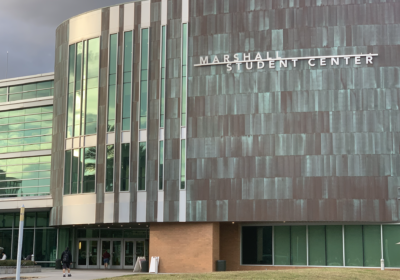Meet the candidates: Julia Cunningham and Jillian Wilson

With the goal to connect students with Student Government (SG) and on-campus resources, juniors Julia Cunningham and Jillian Wilson hope to become a force for change as the next student body president and vice president.
One of their main goals lies in improving communication universitywide as a way to address some of the “legitimate issues currently facing the student body.” Cunningham said their initiatives will aim toward building “direct” communication channels between SG and university departments, including the Office of Multicultural Affairs, as well as with student organizations to better offer resources to students.
The main goal of Cunningham and Wilson’s campaign is to “connect on-campus resources with the students.”
“I think the biggest issue … goes back to a lack of communication,” Cunningham said. “We have all of these great departments, these great organizations, but the general student body is unaware that these resources and these departments exist. So I just don’t think there’s enough promoting, there’s not enough communication and I think even resources are lacking.
“That’s why when we are elected, we want to devote resources and funding to these groups and to the student [organizations] to make sure that we can actually put our money where our mouth is when we talk about diversity and inclusion instead of more performative action that we’ve seen in the past.”
Both Cunningham and Wilson currently serve as senators in the first consolidated term of the Senate. Cunningham works as the vice chair of the ethics committee while Wilson is under the policy committee.
Besides SG, both candidates have been involved in different organizations throughout their time at USF. Cunningham has been a part of the executive board of Minorities in Pre-Law and is a current intern with Congresswoman Kathy Castor while Wilson is a student organization project assistant in the Center for Leadership and Civic Engagement and a volunteer at Moffitt Cancer Center.
When it comes to addressing diversity and inclusion on campus, Cunningham said they plan on passing more resolutions and statutes in Senate focusing on the student body, allocating more funding to student organizations dealing with minority groups and creating more scholarships for students through SG.
“I mean, we’re all college students, we understand the financial impact of going to college and we are aware of the statistics that this financial impact greatly affects minority groups more so than [others], so we want to make sure that these groups have the same resources as everyone else does,” Cunningham said.
“We also want to host more events that surround this idea of diversity and inclusion. So that means working really closely with the Office of Multicultural Affairs, and working with other organizations on campus that support minority groups.”
As a way to voice the concerns of some student organizations, Cunningham and Wilson would allow members from those groups, such as Black Student Union or Minorities in Pre-Law, to attend a Board of Trustees meeting to voice their concerns directly to administration.
A task force focused on diversity and inclusion is also part of their platform. The task force would come up with events and ways to educate the student body on different cultures, religions, socioeconomic classes and backgrounds.
In addition, the duo plans on hosting open forums and town halls as a way to engage with the student body on their biggest concerns around campuses. Wilson said the forums will be a place where students can provide feedback as well as need-based demands.
“We don’t want it to be any secrecy, we want to be broad, open, transparent,” she said. “So we want to have those discussions with students and just directly talk to students … where everyone can come in and everyone can give us their opinions, whether it’s a good opinion that we want them to have or a bad opinion of something we’re not doing correctly.
“We want to have all of that feedback. We’re not just looking for people that just give us a good day. We want the people that make our jobs hard. We want the people that want to see things changed … We don’t want to just be [the only ones] sponsoring it. We want to be involved in the process of having these things change on campus.”
For Cunningham and Wilson, student organizations are often “overlooked” and “neglected” by the current SG administration. Under their platform, they plan on creating a committee and/or a task force to assist student organizations when applying for funding, planning events and providing more resources as a way to empower them.
“What I’ve noticed is that there is no communication between Student Government and student [organizations] and despite the fact that nearly every single student on all three USF campuses are involved in student organizations in one way or another, despite that, they’re the most neglected part of [USF by] Student Government,” Cunningham said.
“We believe that by empowering student organizations, we can empower students.”
One of the main issues they plan on tackling is USF’s response to sexual assault cases and allegations on campus. Through the “Awareness to Action” initiative, Cunningham said they plan on working toward creating more bystander intervention training to reduce sexual violence cases across the USF community.
“‘Awareness to action’ means more education regarding sexual assault, and involving bystanders. And I think that’s something that we currently don’t do, as students we’re not taught at our university. Instead, we’re taught preventative methods so that doesn’t happen to you,” she said.
“Involving everybody on campus is our biggest goal in addressing sexual violence. I think that’s the best way, but it is at every level and every student is aware of how to prevent a situation like that from happening on every level.”
Cunningham said the initiative relies on a multifaceted approach with interventions across each university level, including administration. She said USF must adopt more than one approach on each campus when addressing sexual assault cases on campus, as well as address the issue on “every university level.”
Their “multisystem approach” would engage different on-campus departments, including the Title IX Office, University Police and the Center for Victim Advocacy and Violence Prevention, to address the issue universitywide and provide students with more resources and education tools regarding the issue, according to Cunningham and Wilson.
“For some reason, previous administrations have neglected this issue. Or when this issue has come up, like it did last summer, it’s been swept under the rug,” Cunningham said. “So our awareness action is an important aspect. And it involves actively engaging bystanders to interfere. We want to make our schools safer.
“[The university doesn’t] have a multisystem approach, we only have one approach. And I think just dedicating more time and more resources to addressing sexual violence will just make our campus safer and make those groups who are most impacted the ones that I mentioned before, feel safer on campus.”
Each semester, USF currently offers a bystander intervention course through the Center for Victim Advocacy and Violence Prevention. Despite this course, Wilson believes “there needs to be more.”
She said one of the main reasons why many students might not be aware of the training is due to communication issues between the department and the student body. With a lack of communication, she said the students won’t be aware of resources currently available to them.
“There’s one thing about having the resource, but then there’s another thing about communicating that resource, and that’s the thing that’s lacking,” Wilson said. “There’s not a lot of communication between Student Government and student organizations, or Student Government and the actual students. So I think it really does need to be where ‘this is this course, and we need to broadcast it.’ And we need to have requirements of people taking it.”
Among some of the actions within their plan to prevent sexual assault cases on campus, Wilson said they will work toward implementing mandatory training across Fraternity and Sorority Life as well as the student body.
As their action plan, both Cunningham and Wilson plan on constantly communicating with the student body through weekly meetings as well as working alongside on-campus departments and student organizations to implement some of their initiatives. They also plan on hosting seminars with administration and faculty to make them aware of the student body’s needs and demands.
“I think our role … in all of those meetings is working directly with the students, working directly with these departments and then further communicating what we’re doing, instead of this veil of secrecy that currently exists in Student Government,” Cunningham said.
When it comes to consolidation, both candidates plan on working toward allocating the same resources to students across all three campuses. One of their goals is to advocate for more on-campus fast food dining locations in St. Pete and Sarasota-Manatee.
“It’s so much harder to pick up lunch during classes [at St. Pete and Sarasota-Manatee], because you have to go to the one or two dining halls on campus and it’s kind of inconvenient,” Cunningham said. “So, adding just something like one or two more fast food restaurants on campus that students can go to, that way resources are more evenly allocated to all three universities.
“We also feel like in doing this, it’ll create more jobs on these campuses. So if we do add fast food restaurants on other campuses, that is more jobs for students to take, which is what a lot of students need right now, especially during the current economic crisis we’re in.”
Wilson said they also plan on making current as well as new resources available and prevalent universitywide so no campus is left out due to consolidation.
Students’ mental health concerns are also a top priority for the Cunningham-Wilson ticket. As a psychology major, Cunningham said an initiative focused on providing more mental health resources for students “hits home.”
She said their goal is to advocate for the hiring of more therapists to decrease wait times and provide more resources to students interested in speaking with a counselor. The duo also plans on creating a 24/7 call line in which students can call if they need resources or someone to talk to.
“I’m not sure how we can get it to have it actually be a licensed therapist you can talk to, but just having this call line that you can call, talk to someone, figure out resources and I think that would be the best thing,” Cunningham said.
Over the course of their campaign, Cunningham said students’ needs have been at the forefront of their platform as well as their drive to implement changes universitywide.
“We are very aware of the issues that are affecting the student body and then actually have plans to address those issues as soon as we take over,” Cunningham said. “And I think what makes us unique from the other candidates is our willingness to communicate and be transparent with the student body and our willingness to work closely with them.”






